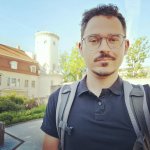
Daniel Dörler
New partner: Austrian National Library
Once again we welcome a new partner to the Citizen Science Network Austria: the Austrian National Library is our newest member. We are very much looking forward to future cooperation!
The Medical University Innsbruck
The Medical University of Innsbruck is a young research centre with a long tradition. The Jesuits established a grammar school in Innsbruck as early as 1562. These were the foundations of the University that was inaugurated in 1669 by Emperor Leopold I. A special tax was levied on salt from Hall – the ‘Hall salt levy’ – to secure funding. The Medical University of Innsbruck was one of the first four faculties (Philosophy 1669, Faculty of Law 1670, Faculty of Theology 1670 and Faculty of Medicine 1674) of the University of Innsbruck. It has been an important flagship for the university throughout its 340-year history.
In the heart of the Tyrol, and consequently in the heart of the Alps, the Medical University of Innsbruck provides the best conditions for successful research, studies and teaching at an attractive location. The main objectives of the Medical University of Innsbruck are to provide top quality teaching and training, world-class research and continuous advancements in top-flight medicine. The organisational units of the Med-Uni are divided into medical theory, clinical practice and further (service) facilities.
Within the framework of the University Act of 2002, the medical faculty was separated from the ‘Leopold-Franzens-University’, and in 2004 the Medical University Innsbruck was established as a university in its own right. Today, it has some 3,400 students and 2,200 employees. The Medical University Innsbruck is the most important medical research and training facility in western Austria and the ‘Alma Mater’ of many Tyroleans, South Tyroleans and students from the Province of Vorarlberg etc.
The Medical University Innsbruck has many years of experience in the research participation of young people, especially in so-called ‘bridging projects’ between the university and local high schools. Schools with a focus on nature science are technically strengthened through the cooperation with the university. Scientific research at the university is not only supported by the participation of future students, but also makes a significant "third mission" contribution to anchoring their research achievements in the public eye.
European Researchers' Night 2022: Save the date!
On 30 September, the European Researchers' Night (ERN) will take place as every year. Citizen science will again play an important role. So mark this day in your calendar and be part of it!
New podcast: wettermelden.at
Did you listen to our new podcast episode live on Radio Orange 94.0 yesterday? If not, you can of course catch up now on the blog or on Spotify. Listen to Thomas Krennert from the wettermelden.at project and learn how you can support weather research.
New project: Protecting Wildlife in Buildings in Vienna
We are very happy to welcome the project Protecting Wildlife in Buildings in Vienna back on Österreich forscht. If you would like to know how you can participate, then have a look at the project website.
Citizen Science Seminar: Forest Areas for the Forest Dormouse
June is a busy month: the next lecture in our Citizen Science Seminar series will take place on 22 June. Birgit Rotter from Österreichische Bundesforste will grant us a look behind the scenes of the project Forest Areas for the Forest Dormouse. Be part of it!
Citizen Science Seminar: last call for registration
The Citizen Science Seminar series will take place again tomorrow. This time the guest speaker is Ronald Würflinger from the Schmetterlinge Österreichs (Austria's Butterflies) Project. If you would also like to be part of it, then register today. You can find the registration form in the corresponding blog post. We look forward to seeing you!
Österreich forscht at BOKU Future Conference
Will we see you tomorrow at the BOKU Future Conference? We would be very happy to have many participants in our workshop.
New open calls in May 2022
In the "open calls" section you can find a new vacancy and there are several conferences and papers that are looking for your contribution in citizen science. Have a look!
Citizen Science Seminar: Austria's butterflies
On 01.06. the next lecture in the Citizen Science Seminar series will take place. This time Ronald Würflinger from the Foundation Blühendes Österreich will be our guest and tell us something about the project "Austria's butterflies". You can participate online and free of charge. We look forward to seeing you!


